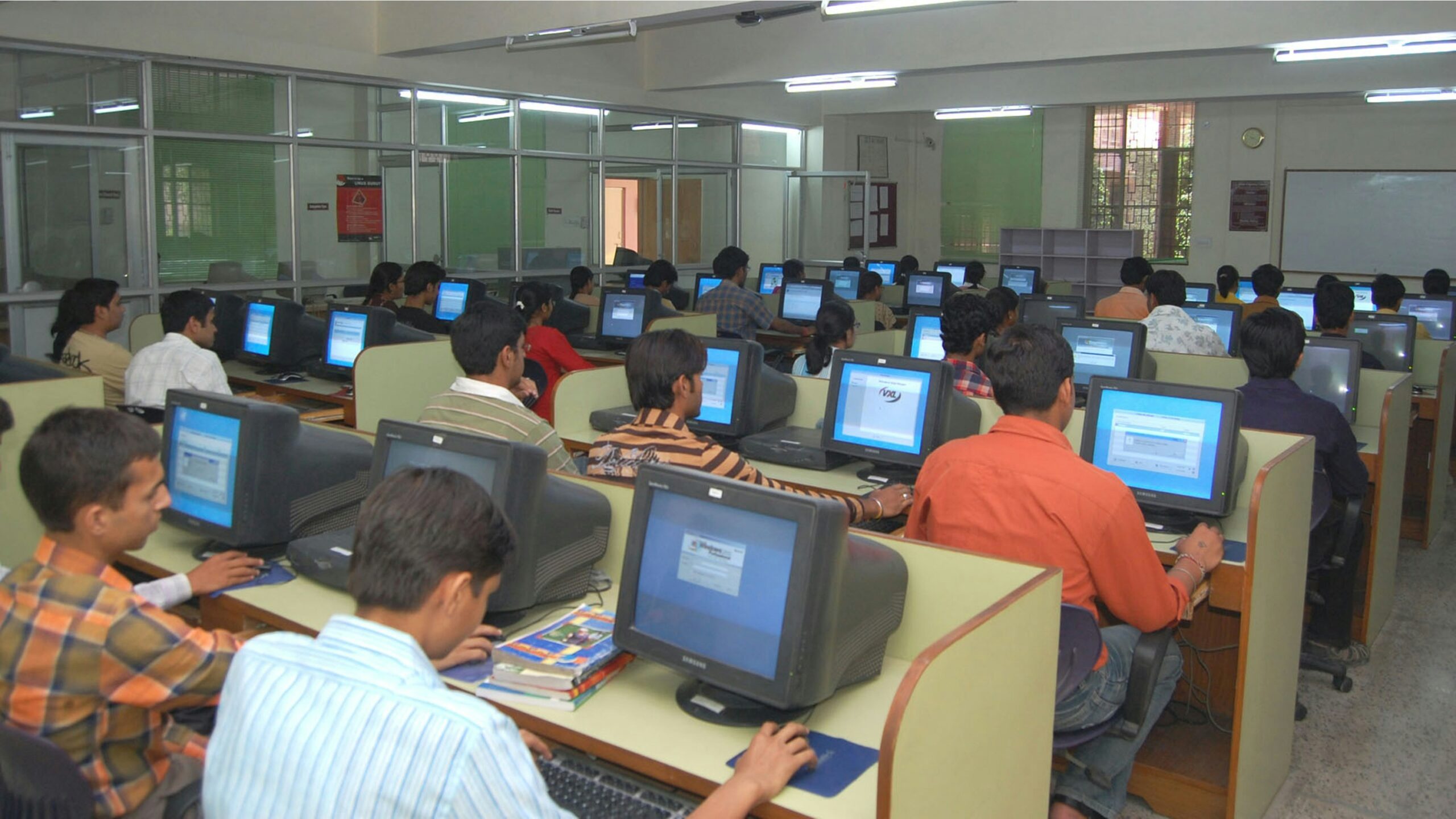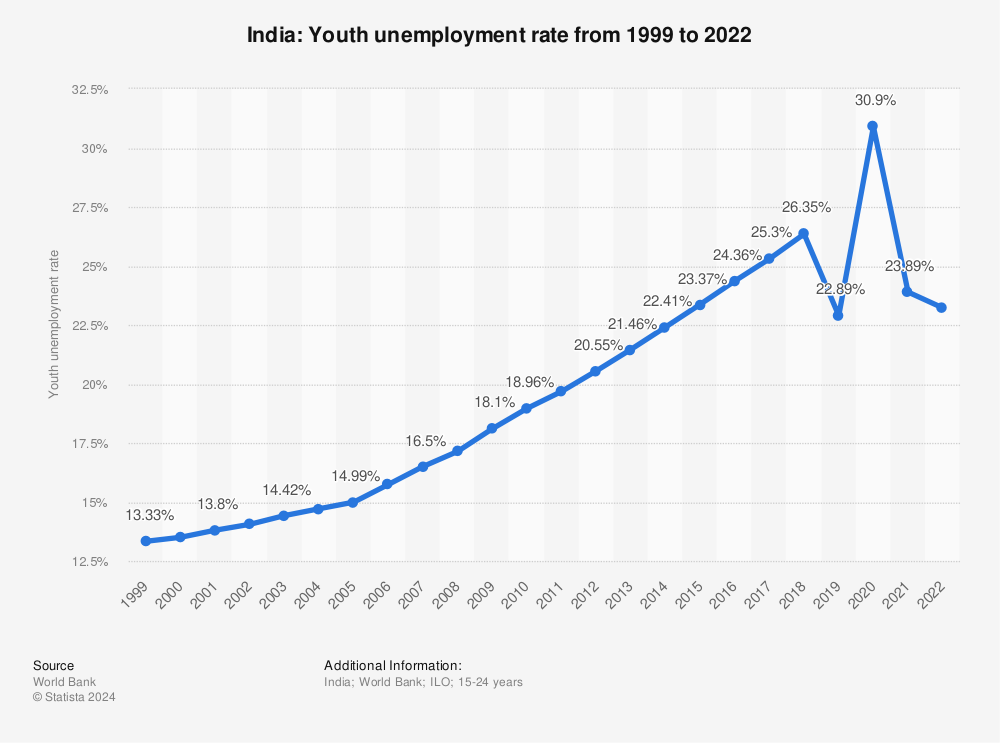What Youth Can Do to Get Employed in India

I’m from India, and I understand the challenges of not finding a job right after college in India. When I graduated from engineering college, I didn’t get a job through campus interviews. Back in the day, we didn’t have internships either. India has the largest youth population in the world. It has over 50% of its population below the age of 25 and over 65% below the age of 35. Nearly 12 million youths enter the workforce every year. Thus, the Indian economy needs to generate that many jobs to generate employment for its youth. Although youth unemployment has reduced over the past years, but is still high at 16% in 2024 based on World Bank data. So in this post, let’s dive into what youth can do to get employed in India.
“The hardest work in the world is being out of work.”
~ Whitney M. Young

Find more statistics at Statista
Contents
Posts Related to What Youth Can Do to Get Employed in India
- How to Solve India’s Unemployability Problem
- Why Work is Godliness?
- 5 Top Reasons for Unemployment in the World
- Who’s Responsible for Unemployment?
- 6 Top Ways To Find Employment
- 12 Best Places to Find Freelance Online Work
- 28 Top Skills for Finding Online Freelance Work
- 5 Best Countries for Job Opportunities
What Youth Can Do to Get Employed in India
I studied mechanical engineering in college and was eager to get into the workforce after I graduated, but it took me a while to land a job. Remember scrolling through the walk-in-interview column of the newspapers in those days and going in person to check it out. Also applied to innumerable companies’ job postings and also made countless cold applications. While I was in college, I also completed a course on Oracle database programming and learnt AutoCAD by myself. But the job-finding journey was arduous.
My job hunting in those days used to involve a lot of attending walk-in interviews. But most of them used to be brutal. Since there used to be way more interviewees applying for limited opportunities. By the way, this is the job scenario for youth trying to enter the workforce. So why would I be an exception? I was just part of the crowd. I got my first job offer to sell credit cards. The pay was good, but I didn’t take the job. Finally, I landed a job with much lower pay, but I loved it because it gave me the opportunity to apply my mechanical engineering learning. That was my first real job as an engineer.
Acquire Job-Ready Skills
Now it’s easy so say, get job ready skills. But the dilemma is that unless you practice any learning, you don’t really get skilled. So how can you gain job-ready skills to begin with? Back in the day when I graduated, we had few internships; project work at industries was the best way to get some industry experience and job skills. I fully enjoyed my tool design project work at a reputed machine tool company. It was an outstanding experience. Nowadays internships are more prevalent, as are industry and university partnerships to develop job-ready skills in university curriculum more integrated. We absolutely need it.
Back in the day when computer skills were getting required, I dabbled in learning AutoCAD at college and went to external evening classes to learn database management and coding skills. I knew I was never great at it, I still preferred to work in the mechanical engineering field, but I did my best to get some job-ready skills that were in demand those days. You never know which job-ready skill might help you land their first job.
Be Willing to Do Any Work
We know work is godliness. But what does it mean? No work is small or big. Either a janitor’s work or a CEO’s work. Work is work. So, be willing to do any work. Trust me, it’s better that not working. My first job offer was in selling credit cards. Had I not had the other engineering-related job offer with me, I would have absolutely sold credit cards. I know I would have learnt a ton. Not much engineering applications but selling skills.
The US is truly the land of opportunity. There are so many hourly job opportunities either in supermarkets, stores or restaurants that there is an opportunity to get some work experience and make some money for a livelihood. But in developing countries like India, it’s a tussle of supply and demand. So it’s difficult for youth to land part-time hourly jobs since there are already many available to do these jobs as full time.
Put in the Hard Work
There is no substitute for hard work. That is my take after working for over 28 years. Just need to put in the hard work even if you are super smart. Luck may come and go, but putting in the hard work is in our control. So even if it feels like we are working so hard and not seeing any results, it’s perfectly fine just to keep on doing what we can and leave the rest to God. The Bhagawad Gita emphasizes performing one’s duties without attachment to results, focusing instead on the action itself as a form of selfless service or offering.
Learn and Explore Better Opportunities
Once you have landed your first job, even if it is not your dream job or company, it’s all about learning. One of my former managers in my career gave me the advice. Don’t run after money but focus on learning. They were golden words, but probably I didn’t understand or appreciate them fully. You can always explore better opportunities once you gain the foundational knowledge and job skills.
Take Risks and Move Outside Your Comfort Zone
This once can be tricky. I have always taken risks and moved outside of my comfort zones while exploring job opportunities. Pretty much, I have followed my gut. I read recently that following the gut might not always be the best thing to do because it may not be based on rationale or sound reasoning. But again, we live one life. We are only answerable to ourselves on our deathbeds. The question I’d ask is, did I try to live a fulfilling life? Did I try to get out of my comfort zone and take the risk to do what I truly wanted to explore and pursue? Moreso did I even tried?
Conclusion of What Youth Can Do to Get Employed in India
Youth are the future of any economy. For India, it is at a crossroads to reap this demographic dividend. The question is, how can the youth get job-ready skills and find work? Learning skills without having a job can be difficult, but nowadays there is ample free content available on the internet and YouTube to learn these skills as long as one has access to a device and the internet. Getting this access is more of an investment in a career. Most of the time, it takes only effort and hard work to learn. It is never easy, but as we say, if there is a will, there is always a way.

Leave a Reply
You must be logged in to post a comment.